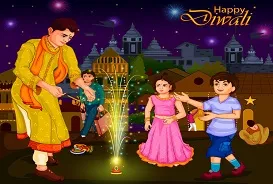Diwali ( Deepawali )
 |
| Diwali ( Deepawali ) |
Diwali
( Deepawali ) is the main festival of Hinduism. Diwali ( Deepawali ), the
festival of lights, is celebrated on the day of Kartik Amavasya. Diwali (
Deepawali ) is also known as Deepawali. It is believed that on this night,
decorated with lamps, Lakshmiji goes out to visit and share happiness with his
devotees. The main story behind celebrating Diwali ( Deepawali ) is related to
Lord Shri Rama in the form of Vishnu.
It
is believed that when Lord Ram reached Ayodhya, the entire city was welcomed by
burning thousands of oil lamps (Diya). The entire Ayodhya was decorated with
flowers and beautiful Rangoli. Since then, Diwali ( Deepawali ) has been called
the festival of lights. People decorate with oil lamps to welcome Lord Rama to
their homes. That is why this festival is also called 'Deepawali'. The
tradition of oil lamps symbolizes the victory of good over evil. People welcome
Goddess Lakshmi by drawing beautiful Rangoli and Paduka (footer) at the
entrance of their homes. To celebrate the festival of Diwali ( Deepawali ),
people distribute sweets and fruits to friends, relatives, and neighbors.
The
celebration of Diwali ( Deepawali ) is spread over a period of five days in
which each day has its own importance and in which traditional rituals are
followed. The celebration begins with 'Dhanteras', an auspicious day on which
people buy utensils, silverware or gold. It is believed that buyers of new
"money" or precious Vaastu are auspicious. This is followed by a
small Diwali ( Deepawali ), in which there is preparation for a big Diwali (
Deepawali ). People start decorating their homes and resemble each other. The
next day, big Diwali ( Deepawali ) is celebrated. On this day, people perform
Lakshmi Puja, visit each other's house with sweets and gifts, burn firecrackers
and spend time with their family and friends. The festival of Govardhan Puja is
celebrated the next day of Diwali ( Deepawali ) and finally, the five-day festival ends with Bhai Dooj where Bahi puts tilak on her brothers' foreheads
and siblings pray for each other's well-being.
The story behind Deepawali festival
In
the joy of ending the exile of their beloved King Shri Ram, Ayodhya residents
celebrated the festival by lighting ghee lamps on the night of Kartik Amavasya.
Since then, the festival of Deepawali is celebrated every year. This festival
is described in Vishnu Purana as well as many other Puranas.
Lakshmi Puja on Deepawali
In
most of the houses, Laxmi Puja on Diwali ( Deepawali ) is worshiped on
Deepawali. According to Hindu belief, Lakshmi Ji visits the earth on the new
moon night and blesses people with glory. There is no mention of the worship of
Ganesha on Deepavali, but without his worship, every worship is considered
incomplete. Hence Vighnaharta Shri Ganesh Ji is also worshiped along with
Lakshmi Ji.
Lamp donation
On the day of Deepawali, Deepdan has special IMPORTANCE. According to Naradpuran,
it is considered auspicious to give a lamp in the temple, house, river, garden,
tree, cowshed, and market on this day.
It
is believed that on this day, if a person worships Goddess Lakshmi devoutly,
there is never an abode of poverty in her house. On this day, the horns, etc. of
the cows are colored and given to them by giving them grass and grain.
Deepawali
festival presents a unique sixth of Indian civilization. Today, of course, the
noise of Mata Lakshmi Aarti has reduced in the noise of firecrackers, but the
basic spirit behind it remains even today.
Other Recommended Links



No comments:
Post a Comment